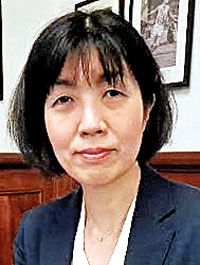News
Key takeaways in Japanese foreign minister’s talks in Lanka
View(s): By Ameen Izzadeen
An early memorandum of understanding on debt restructuring, national reconciliation, governance reforms, and maritime security in the Indo-Pacific region are some of the key takeaways of Japanese Foreign Minister Yoko Kamikawa’s talks with Sri Lankan leaders yesterday, according to her deputy press secretary.
Speaking to a select group of journalists yesterday, the Japanese foreign ministry’s deputy press secretary, Kaneko Mariko, said no sooner the MoU on debt restructuring was reached, Japan could resume yen-loan projects in Sri Lanka, and they included the Bandaranaike International Airport expansion project.

Kaneko Mariko
She said that no decision had been reached on the Light Rail Transit (LRT) project. The cancellation of the project by the Gotabaya Rajapaksa strained bilateral relations.
“We decided to extend assistance to this project, but it was before the economic default. We have decided not to go ahead with this project. First, the MoU has to come for us to reconsider funding yen-loan projects,” Ms. Mariko said. She added that Japan would also have to take into consideration Sri Lanka’s debt sustainability when extending project assistance.
Asked whether Sri Lanka called for the resumption of the LRT project, she said, “Now that Sri Lanka has experienced economic default, we need to make sure that any project has to be of an appropriate size. Otherwise, it will affect the debt sustainability of Sri Lanka.”
However, she said it could be taken up as a new project. She said Japan would prioritise ongoing projects such as the BIA expansion project once the MoU on debt restructuring was reached. Any other project should go through a review process. “That is our position.”
When asked about China’s approach outside the debt-restructuring process, where Japan is the co-chair of the official creditor committee, she said that in debt restructuring, Sri Lanka needs to have an early MoU with all official creditors in a transparent and comparable manner, a position stressed by Japanese foreign minister Kamikawa in bilateral talks with Sri Lankan leaders.
The Deputy Press Secretary said fiscal and economic reforms with the support of the IMF and an understanding with creditors were necessary for Japan and other donors to extend further assistance to Sri Lanka. “We don’t want Sri Lanka to go into default again.” Asked whether the question of corruption was taken up during the talks, especially about the allegation that a minister sought bribes from a Japanese company involved in the airport expansion project, she said she did not want to speak of a specific case. Japan believes anti-corruption measures and the creation of a transparent business environment are important to attract foreign investments. “We believe that with the IMF’s support, Sri Lanka is taking such steps.”
On the maritime security of the Indo-Pacific region, the Deputy Press Secretary said Sri Lanka is located strategically in the Indo-Pacific region.
“Japan is a maritime country, an island nation, just as Sri Lanka is. Maintaining a free and open maritime order based on the rule of law is very important for both Sri Lanka and Japan. Therefore, the two countries need to cooperate on this matter.
“On this aspect, Japan has been extending assistance to Sri Lanka to improve its maritime security capabilities. We are extending technical assistance to train coastguards and have provided a patrol ship. We are ready to offer another vessel equipped with a sonar system so that it can compile nautical charts.”
Asked whether there was a contradiction between Japan’s flagship maritime policy of Free and Open Indo-Pacific and the Quadrilateral Security Arrangement it is pursuing with India, the United States, and Australia, Ms. Mariko said the Quad is not a formal arrangement. “It is kind of a cooperation framework.”
She said Japan’s call for a free and open maritime order is not confined to the Indo-Pacific region. It applies throughout the world. Japan is for a rules-based international order. The global community is facing many challenges, including the Ukraine war and the war in Gaza. Japan does not want to see divisions. It would like to promote more cooperation among countries with shared values.
Asked why Japan, which has a pacifist constitution, was maintaining a military base in Djibouti in the Horn of Africa, Ms. Mariko said it was to counter piracy and maritime terrorism. “Japan depends on free trade. Maritime security is vital. For us, maintaining stability in the Middle East is very important. The security of the Red Sea area is also important. That is why we have decided to have a base in Djibouti,” she said, adding that Japan is collaborating with other countries to ensure maritime security in the region.
Sri Lanka’s ethnic reconciliation process is another key area where Japan is extending its support, she said, adding that Sri Lanka’s stability and prosperity through national reconciliation are very important for the region.
The best way to say that you found the home of your dreams is by finding it on Hitad.lk. We have listings for apartments for sale or rent in Sri Lanka, no matter what locale you're looking for! Whether you live in Colombo, Galle, Kandy, Matara, Jaffna and more - we've got them all!

